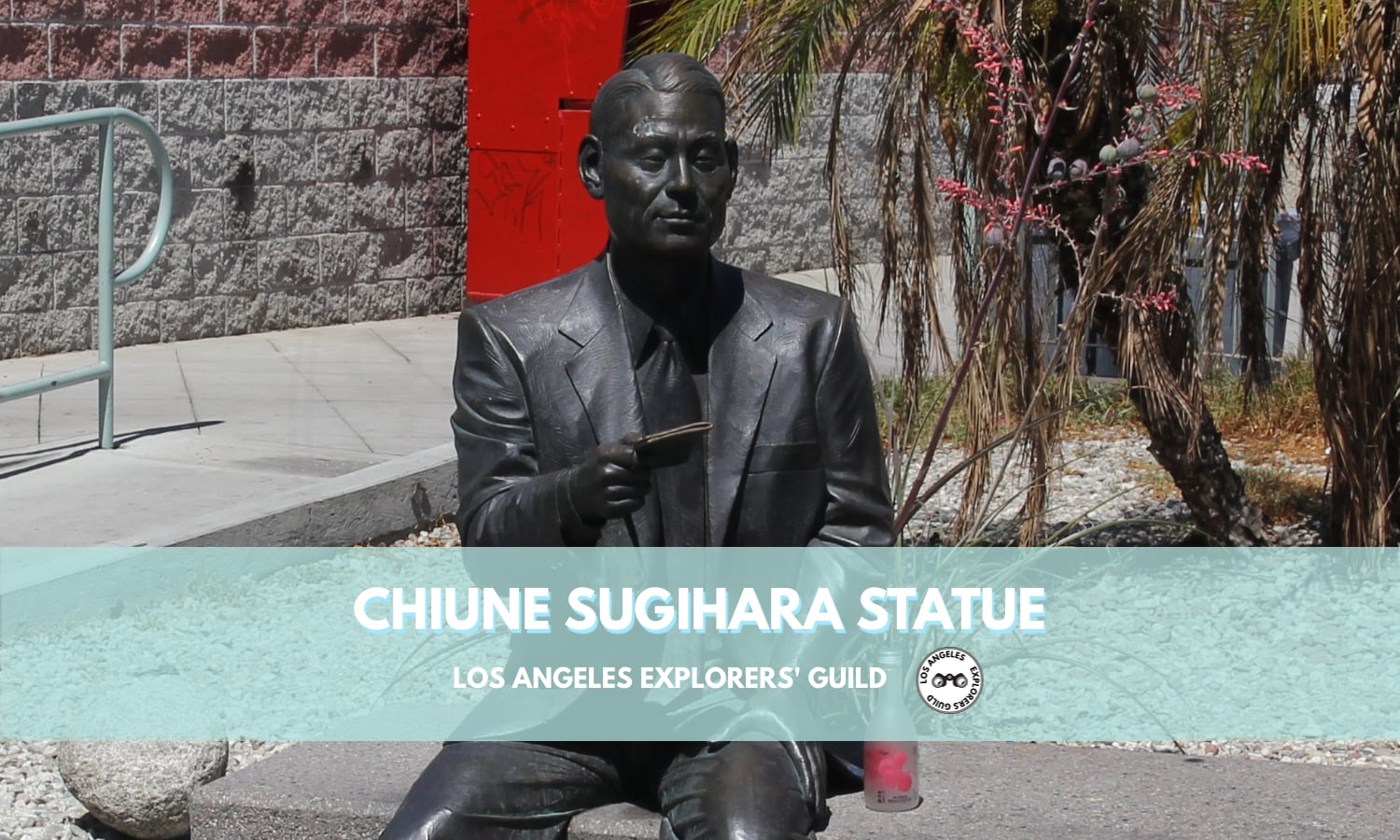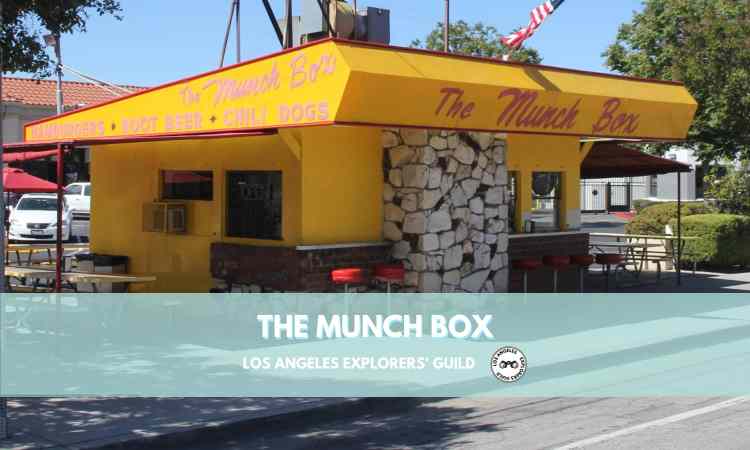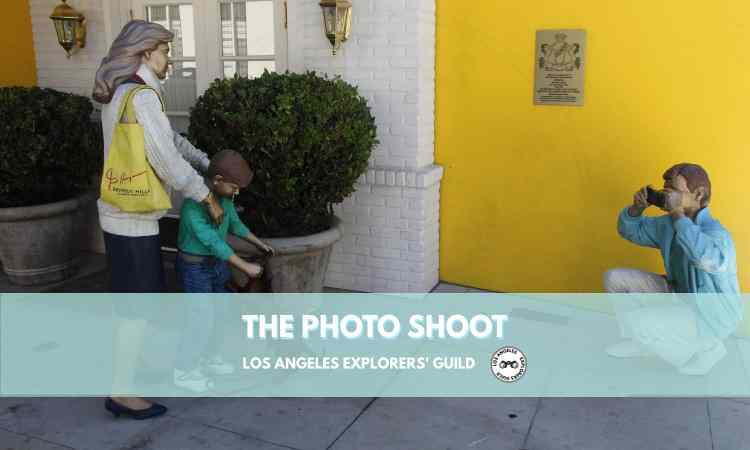Chiune Sugihara Memorial Statue
In Little Tokyo, across the street from Honda Plaza and next to an Office Depot and a Starbucks, you’ll find the bronze statue of Chiune Sugihara, a Japanese diplomat who single-handedly helped more than 2,000 Jews escape Nazi Germany during the Second World War.
Chiune Sugihara was the Japanese Vice-Consul for Lithuania during the outbreak of World War II. One of his duties in this role included issuing visas allowing for travel to Japan.
In this position, he helped Polish and Lithuanian Jews escape Nazi oppression by issuing transit visas, allowing them to leave Poland (then controlled by the Nazis and Soviet Union) and Lithuania (which was under treaty with the Soviets). Most fled through Russia (at highly inflated fares on the Trans-Siberian Express) and China before stopping in Japan on their way to refuge in another country.

For about six weeks in 1940, from mid-July until the consulate closed in September (when Lithuania was annexed into the Soviet Union), Chiune hand-wrote and stamped an estimated 2,000 visas to help Jews flee to safety. During this period, he’d often write more visas on any given day than the office previously issued in a month, and many of the visas he issued were for the heads of households and thus able to bring their families with them.
Legend has it that he continued issuing visas right up to the moment he was evacuated from the country, even throwing signed, blank visas out the window as the train departed the station. His son, however, recently clarified that this didn’t happen.
By issuing these visas, Chiune went against the explicit instructions of the Japanese Foreign Ministry. Many of these travelers hadn’t secured a final destination and often didn’t have the necessary funds required for a Japanese transit visa. His decision to disregard orders and issue so many open visas was very unusual for a Japanese diplomat of that era, and doing so put his life, livelihood, and his family at risk.
The Latest Exploration …
Alta Cienega Motel: The Other Morrison Hotel
It’s been called the most disgusting hotel in Los Angeles. It’s also been called a must-see destination for any serious fan of The Doors. No, it’s not Morrison Hotel. It’s Jim Morrison’s final home in West Hollywood.
Keep readingAfter departing Lithuania, Chiune continued to work diplomatic positions in eastern Europe, serving at the Japanese Consulates in Prague and Königsberg and the Legation in Romania. When the Soviet forces rolled into Romania in 1944, Sugihara and his family were held in a POW camp for 18 months before being allowed to return to Japan. He finally made it back to the Foreign Ministry in 1947, and when he checked in he was asked to turn in his resignation.
For his part in saving thousands of Jewish lives, Chuine was honored with the title of “Righteous Among the Nations” by the State of Israel in 1985, an honor bestowed upon foreigners who have saved the lives of Jews.
Hero of the Holocaust
In Los Angeles, Chiune’s sacrifice and generosity is honored with a bronze statue in a small public space at the northeast corner of Central and 2nd in Little Tokyo. The statue features Chiune sitting on a bench holding out a visa as if he’s handing it to someone. The bench he sits on is wide enough for one or two real-life people to sit next to the figure of Chiune.

A rock with two bronze plaques and an inscription sits next to the statue. The topmost bronze plaque identifies the sculpture by its full title — Chiune Sugihara Memorial, Hero of the Holocaust — and identifies its sculptor — Ramon G. Velasco, who completed the work in 2002. (Velasco also sculpted “The Performer” which sits in front of the Pasadena Playhouse.)
The lower bronze plaque displays a quote from the Talmud: “He who saves one life, saves the world” followed by the necessary recognition: “A gift from the Neman Founation and Levy Affiliated Holdings, LLC.”
The inscription carved into the rock reads:
Chiune “Sempo” Sugihara
1900 – 1986
A Japanese consul in Lithuania who issued handwritten visas to thousands of Jewish refugees, against the express order of his government, and saved innocent lives during the Holocaust.
His courageous efforts put his own family in danger and eventually cost him his career.
Although tragically all but unknown in the West, there are three museums dedicated to Chiune Sugihara and his act of humane disobedience throughout the world: the Sempo Museum in Tokyo, the Chiune Sugihara Memorial Hall in Yaotsu, Japan, and the Sugihara House in Kaunas, Lithuania.
In Search of Sugihara: The Elusive Japanese Diplomat Who Risked His Life to Rescue 10,000 Jews From the Holocaust
By Hillel Lavine. From extensive archival research and interviews — of survivors, fellow students in Harbin, China, diplomats who knew Sugihara, and family members — Hillel Levine reconstructs the fascinating story of this diplomat, spy and Russia expert who single-handedly built a “conspiracy of goodness.”
Chiune Sugihara Memorial – Hero of the Holocaust
- 192 S Central Ave (at E 2nd St), Los Angeles
- GPS 34.047918, -118.239197 [ Google Maps ]
- what3words: ///tight.stable.best
Thank you for visiting the Los Angeles Explorers Guild. If you’re enjoying our explorations of Los Angeles, please consider supporting us on Patreon or making a one-time donation via PayPal. We appreciate your support.
Our Most Recent Explorations









